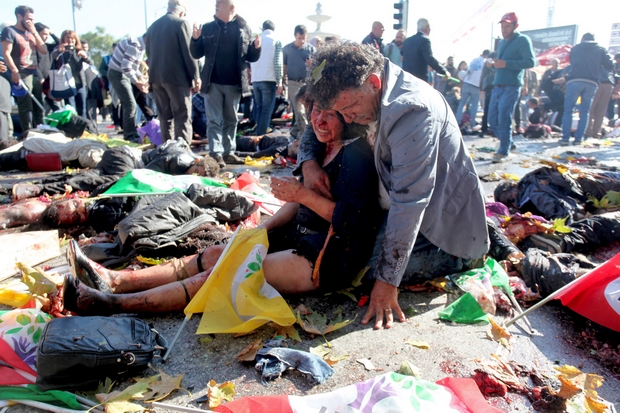
ANKARA — Two bomb explosions in the Turkish capital have killed a total of 86 people, the country's health minister said on Saturday.
Mehmet Muezinoglu said another 186 people were injured as the violence that has rocked the country for months came to the doorstep of the government.
The minister said 62 people died at the scene while 24 others died after being taken to the hospital. Of the injured, 28 were still in intensive care, he said, adding that the attack was "professionally" planned.
It was the deadliest attack in the history of modern Turkey.
The blasts targeted a site in Ankara where people had been planning to gather for a “peace and democracy” march, calling for an end to violence between the government and Kurdish militants.
President Recep Tayyip Erdogan condemned what he called a "terrorist attack" and vowed the perpetrators would face justice.
The state-run Anadolu news agency quoted witnesses as saying that a suicide bomber might have been responsible.
A video on social media captured the moment of the first explosion: young men and women were singing, dancing and waving banners as a massive fireball erupts.
Footage showed banners of various leftist groups — including the pro-Kurdish Peoples' Democratic Party (HDP), which has 80 members in parliament — strewn across the pavement in the area, mixed with blood and debris. Some of the bodies lay on the streets, covered by the flags and banners.
HDP leader Selahattin Demirtas blamed a "mafia state" for the twin explosions.
"Is it possible that a state with such a strong intelligence network did not have prior information on the attack?" he told reporters in Ankara.
The peace rally was called ahead of an election scheduled for Nov 1 and after violence erupted in July between the Turkish army and the Kurdistan Workers' Party (PKK) militant group, ending a two-year ceasefire.
Hundreds have died in the past 10 weeks, including members of the security forces, militants and civilians.
The cycle of violence began on July 20 with a bombing that hit a pro-Kurdish group's meeting in Suruc, a town in southern Turkey, which the authorities have blamed on Islamic State.
Selahattin Demirtas, the head of the HDP, condemned what he called a "massacre ... a brutal, barbaric attack", according to a statement carried by Dogan.
According to media reports this week, the PKK was preparing to declare a ceasefire next week ahead of the election. The Turkish government discounted the reports and said operations by security forces against the group in the southeast would continue.
The HDP has been critical of the security crackdown in the southeast while calling for all sides to refrain from violence.
Turkish nationalists' anger toward the PKK has been growing.
The explosions on Saturday in Ankara took place several minutes apart, according to reports, with the first going off at around 10am local time.
The conflict between the state and the PKK, ongoing since 1984, has left more than 40,000 dead, mostly in the southeast of the country, which has a mostly Kurdish population. The minority group makes up at least 15% of the country.
Turkey, while a member of the Western coalition fighting Islamic State, has differed with allies including the US on the approach to Kurds in Syria.
Turkey views Kurdish groups fighting the Islamic State in Syria as terrorists, while the US views Syrian Kurds as their most formidable partners in the ground war against the Islamic radicals.